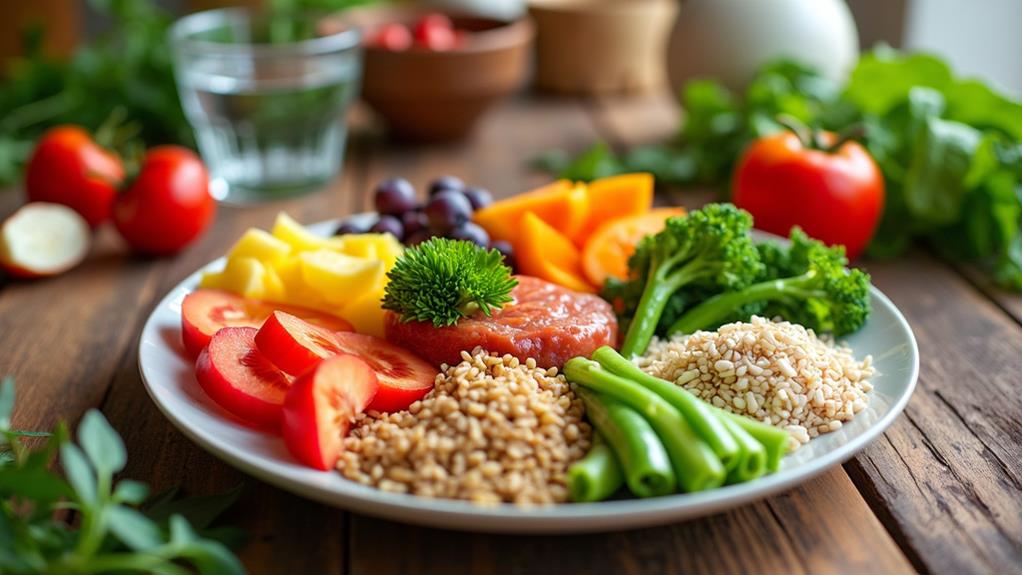As a teenager, maintaining a balanced diet is essential for your growth and energy levels, but it doesn't have to be complicated. By making simple yet effective choices like incorporating whole grains and eating a variety of fruits, you can substantially improve your health. Lean proteins and dairy alternatives play a pivotal role in muscle development and bone strength. Staying hydrated and limiting sugary snacks are just as important. Finally, mindful eating and portion control can help you avoid overeating. Ready to explore these practical tips and make positive changes to your diet?
Incorporate Whole Grains
In order to maintain a balanced diet, incorporating whole grains is essential. Whole grains offer numerous grain benefits that are pivotal for your health. They're packed with nutrients like fiber, vitamins, and minerals, which aid in digestion and keep you full longer. By choosing whole options such as brown rice, whole wheat bread, and oatmeal, you're making sure your body gets the nutrients it needs to function properly.
You might wonder why whole grains are better than refined grains. The answer lies in their nutrient content. Whole grains retain all parts of the grain kernel, including the bran, germ, and endosperm, which means they're richer in fiber and other essential nutrients. Refined grains, on the other hand, lose these indispensable components during processing, making them less beneficial.
Incorporating whole grains into your meals can be simple. Swap white rice with brown rice, choose whole wheat pasta over regular pasta, or start your day with a bowl of whole grain cereal. These small changes can make a big difference in your overall health. Remember, opting for whole options not only enhances your diet but also helps you maintain a balanced and nutritious lifestyle.
Eat a Variety of Fruits
A vibrant and balanced diet isn't complete without a variety of fruits. By incorporating different fruits into your meals, you can guarantee you're getting essential vitamins and minerals that your body needs. Fresh picks like apples, oranges, and berries are not only tasty but also packed with nutrients. You don't have to stick to the same fruits every day; mix it up to keep things interesting and nutritious.
Including a range of fruit favorites can boost your immune system, improve your skin, and provide a natural energy boost. Try starting your day with a smoothie made from a blend of bananas, strawberries, and spinach. For lunch, add slices of juicy mango or crisp apple to your salad. As a snack, grab a handful of grapes or a tangy tangerine. These fresh picks are easy to carry and make for a quick, healthy bite.
Choose Lean Proteins
Choosing lean proteins is a crucial part of maintaining a balanced diet. Proteins are essential for growth, muscle repair, and overall health. However, not all proteins are created equal. Lean proteins, like chicken, turkey, and fish, offer the benefits of protein without the extra saturated fats found in fatty meats. By opting for lean proteins, you support heart health and maintain a healthy weight.
It's easy to fall for protein myths, believing you need large amounts to stay healthy. In reality, a balanced amount is sufficient, even for active teenagers. You don't need to overload on protein shakes or high-fat meats. Instead, focus on variety and quality.
Exploring meat alternatives is another excellent way to diversify your protein intake. Foods like beans, lentils, tofu, and tempeh provide substantial protein without the cholesterol found in animal products. These alternatives are not only nutritious but also environmentally friendly. By incorporating them into your diet, you can enjoy tasty and healthy meals.
Include Dairy or Alternatives
While lean proteins form a solid foundation for a balanced diet, incorporating dairy or dairy alternatives guarantees you obtain essential nutrients like calcium and vitamin D. These nutrients are vital for developing strong bones and teeth, which is especially important during your teenage years when your body is growing rapidly.
If you're lactose intolerant, you don't have to miss out on these benefits. There are plenty of calcium sources that don't involve traditional dairy products. Consider almond milk, soy milk, or lactose-free milk options, all fortified with calcium and vitamin D. Other excellent calcium sources include leafy green vegetables such as kale and spinach, as well as tofu and fortified orange juice.
Yogurt and cheese can also be part of your diet if they're lactose-free or if you can tolerate small amounts of lactose. Look for labels that specify "lactose-free" to avoid any digestive discomfort. Additionally, some hard cheeses like cheddar and Swiss have lower lactose content and might be easier for you to digest.
Stay Hydrated
Your body's health relies heavily on proper hydration. Drinking enough water every day is vital for maintaining energy levels, supporting digestion, and keeping your skin clear. Aim for at least eight glasses of water daily, though your needs might vary based on your activity level and the climate you live in.
To keep your water intake interesting, try adding slices of lemon, cucumber, or mint to your water. This can make it more enjoyable and encourage you to drink more. Carry a reusable water bottle with you, so you can easily sip throughout the day, whether you're at school, playing sports, or hanging out with friends.
It's also important to maintain your electrolyte balance, especially if you're active. Electrolytes like sodium, potassium, and magnesium help your muscles function properly and keep your body fluids balanced. You can get electrolytes from foods like bananas, oranges, and yogurt. Sports drinks can help, too, but choose ones with low sugar content.
Limit Sugary Snacks
To maintain a balanced diet, it's pivotal to limit sugary snacks as they can contribute to various health issues, from weight gain to increased risk of chronic diseases. While sugar cravings are common, especially during adolescence, managing them effectively is key to maintaining overall health. High sugar intake can lead to spikes in blood glucose levels, causing energy crashes and mood swings that aren't good for your daily routine or long-term well-being.
Instead of reaching for sugary snacks, consider healthier snack alternatives that satisfy your cravings without the negative side effects. Fresh fruits, for instance, offer natural sugars along with essential vitamins and fiber. Nuts and seeds provide a satisfying crunch and are packed with protein and healthy fats. Greek yogurt with a drizzle of honey can also be a delightful treat that keeps your sugar intake in check.
When you limit sugary snacks, you're not only protecting your physical health but also fostering better eating habits that can last a lifetime. By making mindful choices and opting for nutritious snack alternatives, you can keep your energy levels stable and support your body's overall health and development.
Monitor Portion Sizes
Monitoring portion sizes plays a pivotal role in maintaining a balanced diet. It's easy to overeat, especially when portions are larger than necessary. By being mindful of how much you eat, you can guarantee you're consuming the right amount of nutrients without overloading on calories.
Start with meal planning. Preparing meals ahead of time helps you control portion sizes and avoid the temptation of second helpings. Use smaller plates and bowls to naturally limit the amount of food you serve yourself. This simple trick can make a significant difference in how much you consume. Additionally, include a variety of food groups in each meal, which helps you feel satisfied without overeating.
Eating mindfully is another essential aspect. Take your time to chew and savor each bite, and listen to your body's hunger and fullness cues. This practice can prevent you from eating more than needed. Avoid distractions like TV or smartphones during meals, as they can lead to mindless eating and larger portion sizes.
At a Glance
To maintain a balanced diet, incorporate whole grains, eat a variety of fruits, and choose lean proteins. Don't forget to include dairy or alternatives for essential nutrients. Stay hydrated by drinking plenty of water, and limit sugary snacks by opting for healthier alternatives. Finally, monitor your portion sizes by meal planning and eating mindfully. By following these tips, you'll be on your way to better health and well-being. Remember, understanding the essential nutrition basics is key to making informed choices about your diet. Pay attention to food labels to ensure you’re getting the right balance of vitamins and minerals, and aim to include a mix of colorful vegetables for added nutrients. Consistency is just as important as variety, so strive to make these habits a part of your everyday routine for long-term benefits.





